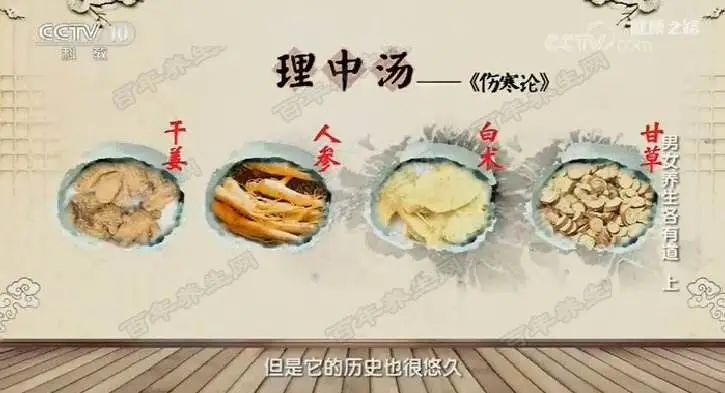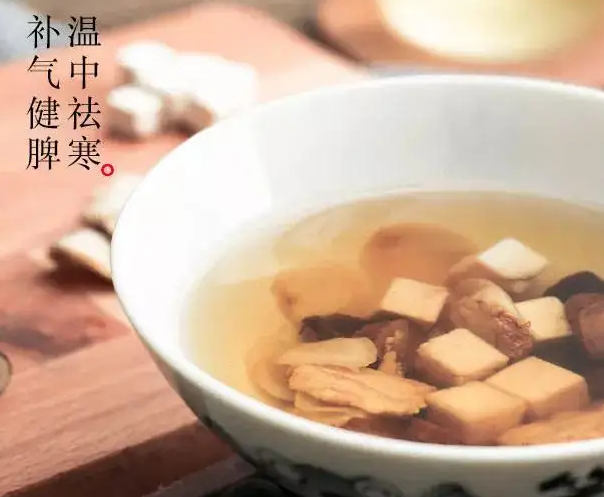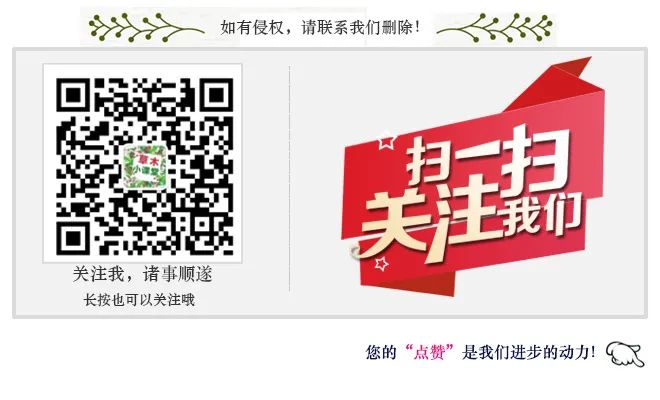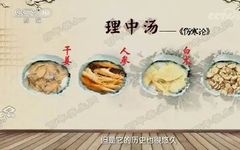【Formula Name】Lizhong Pill, derived from the “Treatise on Febrile Diseases”
【Ingredients】Ginseng (Ren Shen), Dried Ginger (Gan Jiang), Honey-Fried Licorice (Zhi Gan Cao), and White Atractylodes (Bai Zhu), each 3 taels (9g).
【Dosage】 Grind the four ingredients into a fine powder, mix with honey to form pills the size of a chicken egg yolk (9g). Take one pill with several cups of boiling water, crush it, and take it warm, three to four times a day, and twice at night. If there is no heat in the abdomen, increase to three to four pills, but do not exceed the decoction. Decoction method: Cut the four ingredients according to their weight, use eight sheng of water, boil down to three sheng, strain, and take one sheng warm, three times a day. After taking the decoction, if you feel hungry, drink about one sheng of hot porridge, slightly warm, and do not expose yourself. Modern usage: Grind the ingredients into a fine powder, mix with honey to form pills weighing 9g, take one pill with warm water, two to three times a day. Alternatively, prepare as a decoction, dosage to be adjusted.

【Efficacy】Warms the middle, dispels cold, tonifies Qi, and strengthens the spleen.
【Indications】
1. Spleen and stomach deficiency cold syndrome. Symptoms include abdominal pain, preference for warmth and pressure, vomiting, diarrhea, abdominal fullness with reduced appetite, fear of cold with cold limbs, pale tongue with white coating, and a deep, thin or weak pulse.
2. Yang deficiency with blood loss syndrome, such as hematochezia, hematemesis, epistaxis, or menorrhagia, with dark, thin blood.
3. Chest obstruction due to spleen and stomach deficiency cold, or in children with chronic fright, or post-illness preference for salivation.
【Formula Analysis】 The conditions treated by this formula are all caused by spleen and stomach deficiency cold, leading to dysfunction in ascending and descending. The indications are broad but generally pertain to spleen and stomach deficiency cold. Firstly, there is a lack of warmth, presenting as abdominal pain, preference for warmth and pressure, fear of cold with cold limbs, or chest obstruction; secondly, there is dysfunction in transformation, presenting as abdominal fullness with reduced appetite; thirdly, there is dysfunction in ascending and descending, presenting as vomiting and diarrhea; fourthly, there is inability to retain, presenting as yang deficiency with blood loss, or post-illness preference for salivation. A pale tongue with a white, moist coating, no thirst, and a deep, thin or weak pulse are all signs of deficiency cold. The treatment should warm the middle, dispel cold, tonify Qi, and strengthen the spleen. In this formula, Dried Ginger (Gan Jiang) is the monarch herb, being very pungent and hot, warming the middle and dispelling cold, supporting Yang and suppressing Yin, essential for invigorating spleen Yang. Ginseng (Ren Shen) is the minister herb, tonifying Qi and strengthening the spleen to restore transformation. The combination of monarch and minister warms and nourishes the Yang Qi of the middle jiao (spleen and stomach) to restore transformation, retention, and the ability to ascend and descend. White Atractylodes (Bai Zhu) is the assistant herb, drying dampness and strengthening the spleen, preventing spleen deficiency from generating dampness. Honey-Fried Licorice (Zhi Gan Cao) harmonizes and tonifies Qi, serving as the envoy herb. The four herbs work together, one warming, one tonifying, and one drying, to invigorate the spleen and stomach Yang Qi, dispel cold evil, and restore the functions of transformation and ascending and descending, leading to self-healing of the conditions. This formula is referred to as Ginseng Decoction in the “Essential Prescriptions from the Golden Cabinet”. The phrase “but do not exceed the decoction” indicates that decoctions are more potent and act more quickly than pills, and the clinical application should be adjusted based on the urgency of the condition.
【Clinical Application】
1. Key points of usage: This formula is a key prescription for warming and tonifying the spleen and stomach, treating middle jiao deficiency cold. The diagnostic key points include self-benefit without thirst, vomiting, abdominal pain, pale tongue with white coating, and deep, thin pulse.
2. Modern application: This formula is commonly used to treat acute and chronic gastroenteritis, gastric and duodenal ulcers, gastric spasms, gastric prolapse, gastric dilation, chronic colitis, etc., that are attributed to spleen and stomach deficiency cold.

【Cautions】Not to be used in cases of damp-heat accumulation in the middle jiao or spleen and stomach Yin deficiency.
【Appendix】Fuzi Lizhong Pill (from “Taiping Huimin Heji Bureau Formula”): Ginseng (Ren Shen) without the skin, White Atractylodes (Bai Zhu) sliced, Dried Ginger (Gan Jiang) processed, Honey-Fried Licorice (Zhi Gan Cao) fried, and Aconite (Fu Zi) sliced and processed, each one tael (30g), ground into a fine powder, mixed with honey to form pills, ten pills per two taels, take one pill slightly warm before meals, twice daily. Efficacy: Warms Yang, dispels cold, tonifies Qi, and strengthens the spleen. Indications: Middle jiao deficiency cold, with more severe Yang deficiency. Symptoms include abdominal pain, diarrhea with clear stools, or cholera with vomiting and diarrhea, and cramps. Fuzi Lizhong Pill is based on Lizhong Pill with the addition of Aconite, which is very pungent and hot, tonifying both spleen and kidney, generating fire to nourish earth. Its ability to warm the middle and disperse cold is stronger, and it can also warm the kidneys, suitable for severe cases of middle jiao deficiency cold, or combined with kidney Yang deficiency.
【Formula Verse】 Lizhong Pill primarily warms the Yang of the middle, Ginseng, Licorice, Atractylodes, and Dried Ginger, for vomiting, diarrhea, and abdominal pain due to excess Yin cold, with the addition of Aconite to further support Yang.
【Analysis of Zhang Zhongjing’s Original Text】
In the “Treatise on Febrile Diseases”, Section 159: If a patient with febrile disease takes decoctions and experiences persistent diarrhea, with hardness and fullness below the heart, and after taking the Xiexin Decoction, the diarrhea continues, the physician should use Lizhong to treat it, which is very effective. Lizhong refers to the middle jiao, and this diarrhea is in the lower jiao, where the red stone and Yuyuliang decoction should be used. If it still does not stop, then the patient should be treated to promote urination.
Analysis: In cases of Taiyang febrile disease, treatment should involve sweating and resolving. If there is a misadministration of purgative decoctions, it can lead to persistent diarrhea and fullness below the heart, which is the symptom of the Xiexin Decoction. If the Xiexin Decoction resolves the symptoms but other purgative medications are misused, it can lead to persistent diarrhea. At this time, using Lizhong Decoction for treatment may not only be ineffective but may also worsen the diarrhea. This is because Lizhong Decoction specifically addresses the stomach in the middle jiao, and the persistent diarrhea is due to repeated misadministration, causing the lower jiao to become deficient and unable to retain, leading to continuous diarrhea, which should be treated with the red stone and Yuyuliang decoction to stop the diarrhea. If after taking it the diarrhea still does not stop, then the patient should be treated to promote urination, separating water and food, and the diarrhea will cease.
In the “Treatise on Febrile Diseases”, Section 386: In cases of cholera with headache, fever, body aches, and a strong desire to drink water, Wuling Powder should be used; if there is more cold and no desire to drink water, Lizhong Pill should be used.
Analysis: Refer to the section on Wuling Powder.
In the “Treatise on Febrile Diseases”, Section 396: After a serious illness, if the patient has a preference for salivation and has not resolved for a long time, with cold in the chest, Lizhong Pill should be used to warm and harmonize.
Analysis: A preference for salivation indicates deficiency in the stomach with cold drinks, this condition is common and not limited to after serious illness, and this formula has good efficacy.
In the “Essential Prescriptions from the Golden Cabinet – Chest Obstruction, Heart Pain, Shortness of Breath Disease”, Section 5: For chest obstruction, fullness in the heart, and Qi stagnation in the chest, with fullness in the chest and rebellious Qi below the ribs, Zhi Shi (Bitter Orange) and Xie Bai (Garlic Chives) Decoction should be used; Lizhong Decoction can also be used.
Analysis: Fullness in the heart refers to the sensation of blockage and poor Qi flow in the heart. Qi stagnation in the chest indicates that Qi is blocked in the chest, leading to fullness and discomfort. Zhi Shi and Xie Bai Decoction functions to descend and move Qi to relieve fullness, hence it can be used for treatment. The mention of Lizhong Decoction indicates that due to significant deficiency of middle Qi, fluid accumulation can also lead to similar symptoms of chest fullness. The former is a condition of excess, while the latter is a condition of deficiency, and the choice of formula should be based on the nature of the condition.
| Previous Classics======ChineseHerbs–Effects and Functions of Chicken Inner GoldFormula: Timeless Classic – Yupingfeng PowderFormula – Buyang Huanwu DecoctionEffects and Functions of Apricot Kernel, Seven Major Benefits of Eating Apricot KernelChinese Herbs – Effects and Functions of YuzhuChinese Herbs – Effects, Functions, and Contraindications of GinkgoHuangqi’s “Best Partner” Revealed, Persisting for One Month to Dispel Dampness and Cold, Liver and Kidney Thank YouWhat Time Should You Sleep to Avoid Staying Up Late?Medical First Aid: Common Knowledge That Can Save Lives at Critical Moments!Common Trauma First Aid Techniques for Hemostasis and Bandaging, Skills You Should Know |
 Note:PleaseDoNotUseMedicationsAtYourOwnDiscretion,AndFollowMedicalAdvice
Note:PleaseDoNotUseMedicationsAtYourOwnDiscretion,AndFollowMedicalAdvice

